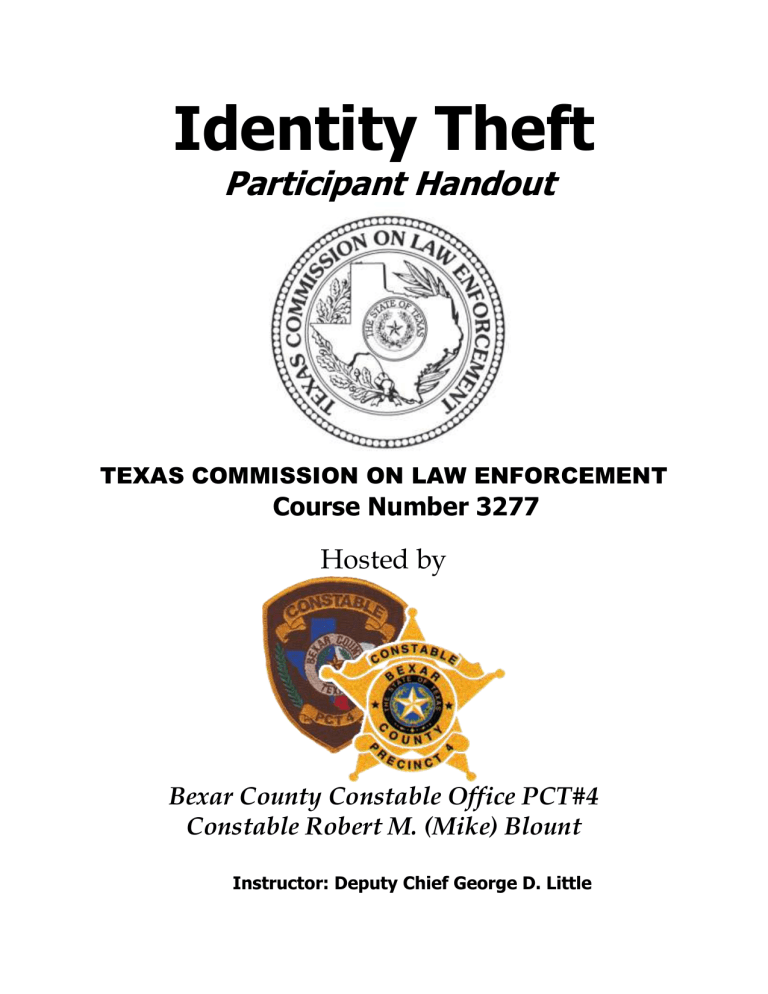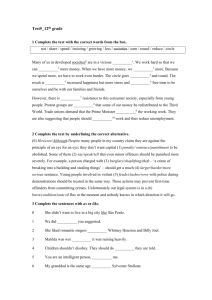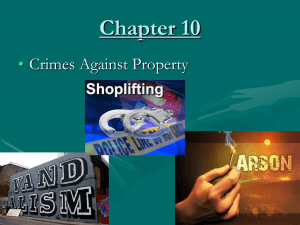Participant Handout Coversheet

Identity Theft
Participant Handout
TEXAS COMMISSION ON LAW ENFORCEMENT
Course Number 3277
Hosted by
Bexar County Constable Office PCT#4
Constable Robert M. (Mike) Blount
Instructor: Deputy Chief George D. Little
Identity Theft #3277
Deputy Chief George D. Little, C.C.P.S. – Advanced TCOLE Certified
Instructor
George D. Little has 43-years of diverse law enforcement experience, in which he has worked a myriad of assignments working literally in every aspect of law enforcement.
He holds an Associate of Science Degree in Criminal Justice from Central Texas
College, a Bachelor of Science in Occupational Education Criminology/Sociology from
Wayland Baptist College and Associates of Science in Criminal Justice, a Bachelor of
Science in Criminal Justice & Criminology and Master’s degree in Criminology and
Human Services and Counter-Terrorism from the University of the State of New York.
George is a retired U.S. Army Military Police (ABN) First Sergeant/E-8 who served his country from Vietnam through Desert Storm for 21-years of honorable service. During his active duty service George served as a Military Policeman (95BV5MXH3 MOS)
Patrol, Traffic Investigations, and Tactical operations. He is a former U.S. Army
Criminal Investigations Division (CID) Special Agent and Military Police Investigations
(MPI) Section Chief. George worked as an under-cover Drug and Narcotics investigator with the U.S. Drug Enforcement Administration (D.E.A.) overseas
European operations, in addition to Protective Services Detail (PSD) working with the
United States Secret Service for overseas assignments that included guarding five presidents, three vice presidents and numerous other VIP personnel; as well as with
Department of State Diplomatic Security Service (DSS) in respect to Embassy Security and Human Trafficking. He has worked homicides, suicides, training accidents/death,
Crime Scene processing specialist, Grand theft, Fraud, VICE, Narcotics/drugs and
Counter-Terrorism investigations, as well as AWOL Apprehension (Wanted Felony
Offenders) and served as an Evidence Custodian where he was cited numerous times for his total accountability, organization and maintenance of numerous evidence rooms. George is an experienced veteran Physical Security and Certified Crime
Prevention Specialist (C.C.P.S.) with expertise in Force Protection, Force Multipliers, and Counter-Terrorism, in addition to being a MP Special Operations Operator
(Counter-Terrorism for 1988 Olympics in Seoul South Korea). He is a former Military
Police School Drill Sergeant, Master Instructor and certified Organizational
Effectiveness Specialist. George served as a Deputy Provost Marshal USFK Area II,
South Korea and as a First Sergeant for several MP units ending his military career as the Operations Sergeant (NCOIC) for the U.S. Army Joint Counter Drug Operations
Element (JCOE) providing federal, state and local military assistance for an 8-state
Continued on next page
Page 2 of 10
Identity Theft #3277
BIO of Deputy Chief George D. Little, C.C.P.S. – Continued : area of responsibility.
He retired from the Bexar County Sheriff’s Office San Antonio, Texas (2008) where he was a Deputy Sheriff, School Resource Officer and the Drug Abuse Resistance
Education ( D.A.R.E.) Coordinator for Bexar County and was the 2004 National
D.A.R.E. Officer-Of-The-Year (and former D.A.R.E. America- Texas D.A.R.E. State
Coordinator). George has over 20 year’s veteran experience working in a school district environment. In addition George received his Basic, Intermediate, Advanced and Masters (Peace Officer) Law Enforcement certifications from the Texas
Commission On Law Enforcement (TCOLE). He has authored and co-authored numerous articles on Counter Terrorism and Law Enforcement serving as a college adjunct professor teaching criminal justice and counter-terrorism undergraduate courses. He has a passion for teaching; in addition to being a Texas Certified Crime
Prevention Specialist (C.C.P.S.). George is the former Director of Institute for
Criminal Justice Studies (ICJS) – Texas State University where he developed the first ever comprehensive School-Based Law Enforcement Officer (SBLE) holistic certified training program, and state-wide TCOLE certified Crime Prevention certification curriculums; as well as authored, researched and developed numerous state-of-the art, scientific and researched-based, “Best Practices” specialized law enforcement curriculums. He is a certified Federal Air Marshal Service (FAMS) LEO Flying Armed
Instructor. George is currently the Deputy Chief for INTEL, Homeland Security and
Training for the Bexar County Constable Office, PCT#4. He is a past President/Life
Time Member Texas D.A.R.E. Officers Association, Member Texas Crime Prevention
Association (TCPA), Life-Time Member Federal Criminal Investigator’s Association and State Coordinator for the International Counter-Terrorism Officers Association
(ICTOA). Deputy Chief George D. Little was the 2011 TCOLE Professional
Achievement Award recipient, 2011 – 2012 Cambridge Whose Who – Leading Law
Enforcement Professional Award, and has received numerous U.S. Drug Enforcement
Administration Awards and recognitions; recipient of the Federal Bureau of
Investigation - Directors Community Leadership Award; and American Society for
Industrial Security – Business Crime Council Award, Fraternal Order of Police (FOP)–
Medal of Valor, Special Forces Association Award for Excellence in Counter-Terrorism.
George is a former appointed member of the U.S. Department of Justice – National
Institute of Justice Technical Working Group for School Safety, past Page for U.S.
Senator Carey Estes Kefauver Tennessee 1963; in addition to being a certified
Honorary Tennessee House of Representatives Sergeant At Arms, Honorary
Tennessee Colonel and Kentucky Colonel.
Instructor Instructor
For For
Page 3 of 10
Identity Theft #3277
Abstract
Abstract
This instructor guide is designed to meet the educational requirements for identity crimes training established by legislative mandate: SB473-(78Reg).
Note to Training Providers:
This instructor guide is designed as a standardized outline for all training providers; however, instructors are expected to develop detailed lesson plans that supplement this outline. The incorporation of scenarios is recommended to facilitate learning of the material. The slide presentation may assist you in your course delivery. In addition, Appendix C provides a summary of recent Texas House and Senate bills relating to the Section 32.51 of the Texas Penal
Code (Fraudulent Use or Possession of Identifying Information).
Target Population:
Length of Course:
Law enforcement personnel in Texas
A minimum of
3
hours
Facility Requirements:
Instructor Qualifications:
Classroom and instructional materials
Instructors should be knowledgeable about identity theft and law enforcement issues.
Evaluation Process and Procedures: An examination is included. (Optional)
Reference Materials: Reference materials are located at the end of the course.
Acknowledgements: The Commission wishes to thank Sgt. Eric C. Gilbert and
Sgt. Hilan Priddy of the Texas Department of Public Safety
Training Bureau, the Criminal Investigative Division of the
U.S. Secret Service, the Postal Inspection Service, the
International Association of Chiefs of Police, the Federal
Trade Commission, and the office of the Texas Attorney
General and Deputy Chief George D. Little, Bexar County
Constable’s Office PCT#4 for their invaluable contribution to the development of this course.
Page 4 of 10
Identity Theft #3277
Defining Identity Crimes
Instructor Note: At the beginning of the presentation it is recommended that the instructor administer the pre-course quiz “Identity Crimes: A Quiz For Consumers.” The students should take a few minutes to complete the quiz. After completion, the instructor should provide a brief oral review of the test answers with the class after emphasizing the fact that more detailed information on each question will be provided during the lecture.
Unit Goal 1.1 The student will be able to recognize the types of identity crime.
1.1.1 The student will be able to provide a definition of identity crime.
1.1.2 The student will be able to identify types of crimes associated with identity crimes.
1.1.3 The student will be able to list personal and financial identifiers.
1.1.4 The student will be able to identify currents trends associated with identity crimes.
How Identity Crimes Occur
Unit Goal 2.1 The student will be able to recognize how identity crimes occur.
2.1.1 The student will be able to identify how identity crime is commonly perpetrated.
2.1.2 The student will be able to identify techniques used to procure false identification.
Laws and Statutes Governing Identity Crimes
Unit Goal 3.1 The student will be able to recognize the legal aspects of identity crimes.
3.1.1 The student will be able to identify the federal statutes dealing with identity crimes.
3.1.2 The student will be able to identify the state statutes dealing with identity crimes.
3.1.3 The student will be able to define the term “security alert,” according to the Business
Code.
3.1.4 The student will be able to define “security freeze,” according to the Business Code.
Page 5 of 10
Identity Theft #3277
Prosecuting Identity Crimes
Unit Goal 4.1 The student will be able to request information needed for an ID crime offense report.
4.1.1 The student will be able to list information needed for an ID crime offense report.
4.1.2 The student will be able to identify the governmental and business entities that are notified in identity crimes.
Experian 1-888-397-3742 (or online at www.experian.com)
Trans Union 1-800-680-7289 (or online at www.transunion.com)
Equifax 1-800-525-6285 (or online at www.equifax.com)
Identity Crimes Prevention
Unit Goal 5.1 The student will be able to recognize techniques for educating victims and the public on identity crime.
5.1.1 The student will be able to identify techniques for educating victims and the public on identity crime.
5.1.2 The student will be able to list guidelines for personal protection against identity crime.
5.1.3 The student will be able to list the steps to take if identity crime occurs.
References and Resources Consulted
Abbott, Greg (Texas Attorney General), “A police report is crucial in cases of identity theft”
Chicago Police, “Police Officer’s Handbook – Identity Theft”
Federal Trade Commission, “ID THEFT – When bad things happen to your good name”,
September 2002
Identity Theft Resource Center (www.idtheftcenter.org)
Texas Department of Public Safety, Public Information Office, “Steps to Help Prevent Identity
Theft”, April 9, 2002
U.S. Department of Justice, “Identity Theft: A Quiz for Consumers”
U.S. Department of Homeland Security, U.S. Secret Service, “Identity Crimes Interactive
Resource Guide”
Page 6 of 10
Identity Theft #3277
Statutory References
U.S.C. Title 18, Chapter 47 – Identity Theft and Assumption Deterrence Act.
Texas Penal Code 32.51 – Fraudulent Use or Possession of Identifying Information
Texas Code of Criminal Procedure 55.02 – Expunction of Records
Texas Code of Criminal Procedure 60.19 – Information Related to Misuse of Identity
Texas Business and Commerce Code (Sections 20.01, 20.03, 20.031 thru 20.038) – Definitions and rules governing “Security Alerts” and “Security Freezes”, Amendments to Chapter 35D –
Confidentiality of Social Security Number
Page 7 of 10
Identity Theft #3277
Identity Theft: A Quiz For Consumers
1.
When I keep my ATM cards and credit cards in my wallet, I never write my PIN (Personal
Identification Number) on any of my cards.
YES ( ) NO ( )
2.
When I leave the house, I take with me only the ATM and credit cards I need for personal or business purchases.
YES ( ) NO ( )
3.
When I get my monthly credit-card bills, I always look carefully at the specific transactions charged to my account before I pay the bill.
YES ( ) NO ( )
4.
When I get my monthly bank statements, credit-card bills, or other documents with personal financial information on them, I always shred them before putting them in the trash.
YES ( ) NO ( )
5.
When I get mail saying I’ve been pre-approved for a credit card, and don’t want to accept or activate that card, I always tear up or shred the pre-approval forms before putting them in the trash.
YES ( ) NO ( )
6.
I request a copy of my credit report at least once a year.
YES ( ) NO ( )
7.
If the volume of mail I get at home has dropped off substantially, I always check with my local post office to see if anyone has improperly filed a change-of-address card in my name.
YES ( ) NO ( )
8.
If I think that I may be a victim of identity theft, I immediately contact: the Federal Trade Commission to report the situation and get guidance on how to deal with it,
YES ( ) NO ( ) the three major credit bureaus to inform them of the situation,
YES ( ) NO ( ) my local police department to have an officer take a report, and
YES ( ) NO ( ) any businesses where the identity thief fraudulently conducted transactions in my name.
YES ( ) NO ( )
How did you score on this quiz? If you checked even two or three of the “NO” boxes, it means that you need to take more of the precautions that are described in this course. Remember that identity thieves, unlike robbers or fraudsters, don’t have to have any personal contact with you in order to commit their crimes. The more you do to protect your personal information, the lower the odds that you’ll become a victim of identity theft.
This quiz was adapted from a U.S. Department of Justice publication available at the website below. www.usdoj.gov/criminal/fraud/idquiz.html
Page 8 of 10
Identity Theft #3277
ACKNOWLEDGEMENTS:
Important feedback and additions to all sections were provided by Deputy Chief George D. Little, Captain Arthur Neal Burford and Deputy
Constable Roland Berg, Bexar County Constable’s Office PCT#4.
Page 9 of 10
Identity Theft #3277
Page 10 of 10







